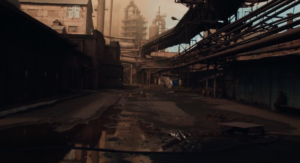
A ghostly smelting plant in ‘Mariupolis,’ distributed by Twenty Twenty Vision films
Mantas Kvedaravicius, a Lithuanian documentary filmmaker, was killed by Russians this week as he tried to leave Mariupol in southern Ukraine. He is best known for the film Mariupolis, which was nominated for prizes at international film festivals in Berlin, Hong Kong, and Stockholm; he won Best Director at the festival in Vilnius.
Mariupolis is Direct Cinema, so there is no conventional storyline or arc. People are not named (until the credits), and they do not interact with the camera. There is neither explanatory voiceover nor captions for locations. Subtitles translate Ukrainian speech but often only deepen the mystery.
“Will you be here?” a woman says into a cell phone. She seems to have a soft violin case on the table in front of her. “So I’ll be on my own?” She listens to something we cannot hear for a long time.
“The idea of Mariupolis was to show the course of life during wartime,” Kvedaravicius told The Odessa Review in 2016, shortly after the film was released, “how regular people carry on with their everyday lives mere steps away from a war zone, gunshots, explosions and death. It is a film about the pricelessness of every second of life. It is not about war, but about life next to war and lived in spite of war.”
The slow care of presenting everyday people in their homes, workplaces, and community spaces adds up to something powerful. We see performers rehearse at the Folk Greek Theater Studio of Sartana, an ethnic Greek community in the Mariupol district (Kvedaravicius is of Greek ancestry), as well as what appears to be a wedding reception at the Sartana Cultural Centre. In Mariupol we are shown Metallurgical Plant V. Ilyich, an International Acting School, and the Holy Virgin Protection Church. At times the film moves at the very human speed of (unproductive) fishing, or a cigarette break.
Yet this is not like the Soviet footage shot and used in State Funeral, which was Direct Cinema meant to show an empire together in its shared grief across 11 time zones. Mariupolis is more dreamlike—curtains glow like clouds—but very sharp-focused. Industrial machines become a nest of spiders, or dizzying shadows on mine tailings. Lions watch a zookeeper approach with an axe in his hand, but he is only there to pull off a note pinned to a tree in the outer ring of their enclosure. A bear chews the bars of its cage, which cannot help but have resonance with Putin’s Russia.
(“Can documentary filmmaking be discussed separately from politics?” The Odessa Review asked Kvedaravicius. He replied: “You could make a movie about a simple butterfly. Someone will inevitably extrapolate it into ecology, and so it goes.”)
There has been much made recently of Ukraine’s desire to live with liberal, individualistic values over authoritarianism and group-think. The film is personal in this way. We are invited to puzzle out what individuals do and mean, as well as their connections to others: that young woman, the cobbler’s daughter, I think, is the student nervously trying her first on-camera news reports, and also the person chasing soldiers down the street, microphone in hand, toward some unexpected conflict shortly after that.
Above all, as the images accumulate, we get a sense of directorial choices made. The corporate video on the use of fire extinguishers is followed by an ironic insistence by the company minder that “It is believed that things manufactured here are pricey, but life is priceless. Remember that.”
Two men shoveling wet earth turn out not to be digging graves but working in a crew to prettify an area next to train tracks. Two shirtless soldiers playing backgammon in the sun ignore a platoon of comrades in combat gear, rifles up, spider-walking across the lawn behind them. The reception hall with the bride who cannot stop smiling appears to be the same building where a machine gun is firing as the celebratory music plays, muted, through the wall.
Six years after this film, Ukrainian President Zelensky believes there may be “tens of thousands” of deaths in the city, which he said has been “completely destroyed.” More than 140,000 refugees escaped; others are still trapped or were taken forcibly to Russia. Unconfirmed reports yesterday claimed a Russian drone dispersed a chemical that may have been a nerve toxin.
Mariupolis continues to be of interest in part because it is like a ghost appearing before the disaster that created it. One of Kvedaravicius’ subjects, a woman in a public gathering upset with a man who appears to be a Soviet veteran in uniform for a commemoration, cries in frustration, “All of it will end, eventually. Everything is going to be fine. There will be joy again. It can’t be like this forever. Everything bad will go away.”
Mariupolis can be streamed here from Takflix for less than three dollars.
